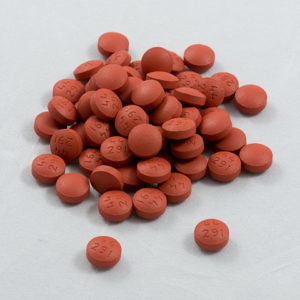
Photo credit: Wikimedia / public domain
Non-steroidal anti-inflammatory medicines (NSAIDs) have been around since the 1960s. They include ibuprofen (Advil, Motrin), naproxen (Aleve), meloxicam (Mobic), diclofenac (Voltaren) and over a dozen others. NSAIDs are used to treat pain, decrease fever, and decrease inflammation. They are prescribed over 100 million times annually in the US. Naproxen and ibuprofen are also available over the counter.
NSAIDs were a boon compared to the medications that were available before them. They are more effective for pain than acetaminophen (Tylenol), and are not addictive like opiates. But they do have some side effects. They decrease platelet function and thereby increase bleeding risk, and they can irritate the stomach lining and even cause ulcers. They can also cause kidney injury. These risks are quite small when used for the occasional headache or muscle sprain, but some patients require long-term daily pain medication. These patients’ risk of stomach bleeding from NSAIDs is substantial.
To address this risk, a novel family of medications emerged in the 1990s – COX-2 inhibitors. These medications were designed to have the analgesic and anti-inflammatory benefits of NSAIDs with much lower gastrointestinal risks. In the US two COX-2 inhibitors became available, celecoxib (Celebrex) in 1998 and rofecoxib (Vioxx) in 1999. But Vioxx was found to increase the risk of stroke and heart attack in patients taking it daily and was withdrawn from the market in 1999.
Thereafter it was discovered that traditional NSAIDs likely also increased stroke and heart attack risk somewhat, but the assumption was that Celebrex increased stroke and heart-attack risk more than NSAIDs because it was in the same family as Vioxx. After Vioxx’s withdrawal, the FDA allowed Celebrex to continue to be sold as long as its effect on stroke and heart attack risk was systematically evaluated. The resulting ten-year study was published in November in the New England Journal of Medicine (NEJM).
The study randomized over 24,000 patients who required daily pain medication for arthritis. (Patients for whom Tylenol was sufficient were excluded.) The patients all had some risk factors for heart disease or stroke. They were randomized to receive celecoxib (Celebrex), ibuprofen, or naproxen. Notably, they were all given esomeprazole (Nexium), a strong acid-blocker, to decrease the risk of developing ulcers. They were treated with these medications for about two years on average and were followed for a few years thereafter. The incidence of stroke, heart attacks, intestinal bleeding, kidney injury and other adverse events were tracked. The patients were also asked about the severity of their arthritis pain.
The results were surprising. The patients receiving Celebrex had strokes and heart attacks at similar rates as the patients receiving ibuprofen or naproxen. There was no evidence of higher stroke or heart attack risk with Celebrex. As expected, the patients taking Celebrex had fewer gastrointestinal side effects than those taking the other medicines. Celebrex was also safer than ibuprofen in terms of kidney injury, but similar to naproxen. The patients achieved very similar levels of pain relief, with the patients receiving naproxen having slightly better relief than those receiving Celebrex or ibuprofen.
Some cardiologists criticized the results, arguing that although the trial was supposed to study patients at high risk for stroke and heart attack, the number of actual heart attacks and strokes observed were quite low, suggesting the study enrolled patients at much lower risk than intended. Still, in the population studied, Celebrex resulted in no more strokes or heart attacks than naproxen or ibuprofen.
The generalizable message is that all pain medications have side effects. For the occasional ache and pain, almost any choice is safe. If prolonged daily pain medication is required, try acetaminophen (Tylenol) first. (Tylenol has important liver and kidney risks that you should discuss with your doctor if you’ll be taking it daily.) If acetaminophen is ineffective, Celebrex (celecoxib) or an NSAID is a reasonable next choice. Celebrex is much less likely to lead to gastrointestinal bleeding. If you take Celebrex or an NSAID daily for weeks or longer, a daily antacid in the proton pump inhibitor (PPI) family is important to protect your stomach. Whichever medication you take, try to find the minimum effective dose and take it for the shortest possible duration.
Learn more:
Study Suggests Celebrex Isn’t Riskier Than Rival Pain Drugs (Wall Street Journal)
10-year study eases concerns about Celebrex, heart risk (CNN)
Celebrex May Not Pose More Heart Risk Than Others (WebMD)
Cardiovascular Safety of Celecoxib, Naproxen, or Ibuprofen for Arthritis (NEJM article)

